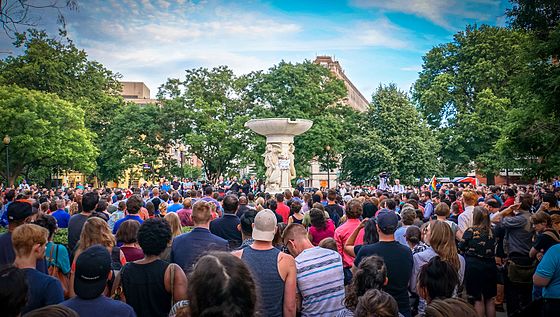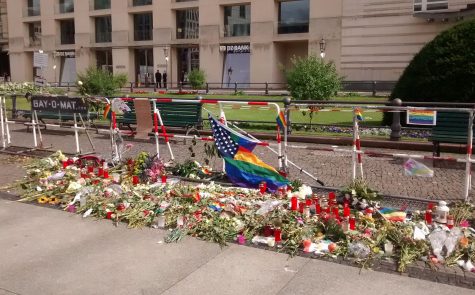Terror in the world this summer: Orlando, Istanbul and Nice

Courtesy of Wikimedia Commons
A vigil that took place in Dupont Circle in Washington D.C. on June 13. Over 600 people attended the vigil, which was held by the Muslim American Women’s Policy Forum.
September 1, 2016
A boisterous nightclub. A bustling international terminal. A national holiday celebration. Ordinary places teeming with ordinary people, people with their own lives and their own stories.
Some merrymakers at the nightclub might have been there to commemorate their birthdays with friends while others were there alone to alleviate themselves- even if it was only for one evening– of their troubles.
At the airport, some travelers may have been running late to catch a departing flight, and others might have finally stepped foot in their home country after days or weeks or months or even years away.
Partygoers might have been in attendance to flaunt their pride and patriotism towards their nation or to immerse in the experience of a new culture.
No matter what their stories were, they all ended the same way: massacred by a terrorist. Without mercy, without warning, most without even bidding farewell to their loved ones, and all because of the deluded notions of men with weapons of terror.
On June 12, a night that started out as a celebration of music and dancing, of individuality and self-expression, 49 innocent civilians– men and women, the youngest only eighteen years old– were gunned down in what was not only a terrorist attack, but the most severe hate crime against the LGBT community in United States history.
Omar Mateen, an American-born security guard who had pledged allegiance to the Islamic State, killed 49 civilians and injured 53 others in a terrorist attack that took place inside of Pulse, a gay nightclub in Orlando, Florida.
The incident was the most lethal act of terrorism in America since the September 11th attacks and the deadliest mass shooting by a lone gunman.
In a statement to the press released after the shooting, President Obama vowed to continue the pursuit against ISIS abroad and renewed his call for gun control and restrictions on assault weapons like the rifle Mateen used.
Obama also affirmed that it is necessary to end the violence and discrimination perpetrated against members of the LGBT community not only in the United States, but across the world.
“Here in Orlando, we are reminded not only of our obligations as a country to be resolute against terrorists, we are reminded not only of the need for us to implement smarter policies to prevent mass shootings, we’re also reminded of what unites us as Americans, and that what unites us is far stronger than the hate and the terror of those who target us,” Obama said in his statement.

While Orlando rattled the United States, extremists struck nations all around the world. On June 28 at the Atarük Airport in Turkey- one of the busiest airports in the world- suicide attackers tied to ISIS opened fire outside of a security checkpoint and detonated a bomb in the airport parking lot, killing 41 people and wounding 137 others.
Nearly three fourths of the world’s terror attacks occur in the Middle East due to countries like Turkey facing the threats of various terrorist organizations and militant groups. Sophomore Dilara Ezer traveled to Turkey over the summer to visit her extended family and witnessed the aftermath of the attack.
“A lot of my other family members that live in America didn’t go because they were afraid of all the terrorist attacks. My family thought that we should go now before it gets any worse,” Dilara said. “We left Turkey to go to France for a little bit, and just a day after we left, the airport we were just in was attacked. When we left France and went back to the airport, I could still see the bloodstains on the walls. My family and all the people I care about live there; I’m really scared for them.”
On July 14, an attacker barrelled a nineteen-ton truck into revelers celebrating France’s Bastille Day on the Promenade des Anglais in Nice, plowing through civilians for over a mile and leaving 84 people dead.
Occurring only eight months after the Nov. 13 shootings across Paris, the attack prompted French President Francois Hollande to increase military force in Iraq and Syria and extend France’s state of emergency by three months.
During the attack, French teacher and FNHS advisor Galina Tchourilova was attending courses in Vichy, France, just three hours north of Nice.
“It was Bastille Day, so there was a big international group attending. There were children and families,” Tchourilova said. “It was a difficult, tragic event; unfortunately, nothing could have prevented this type of attack.”
Many people share a similar view of terrorism: that it is inevitable. Years of terror attacks have proved that all it takes is a gun and hatred to make a fun night out one’s last night out, or to transform a national holiday celebration into a bloodbath.
Yet these incidents have spurred organizations and charities to contribute towards the communities affected by the attacks; they have resulted in vigils, memorials and moments of silence held to pay tribute to those affected. They have united people of different cultures, all around the world, under a common cause: peace.
“The day after the attack, our international school held a minute of silence to commemorate the victims and we had representatives from over 200 countries,” Tchourilova said. “It was powerful to see how people all over the world shared the same emotions; any type of support gives a message of peace and understanding. These attacks are trying to destroy trust and put fear everywhere, and we have to do everything to fight that.”


















![“[Building nerf blasters] became this outlet of creativity for me that hasn't been matched by anything else. The process [of] making a build complete to your desire is such a painstakingly difficult process, but I've had to learn from [the skills needed from] soldering to proper painting. There's so many different options for everything, if you think about it, it exists. The best part is [that] if it doesn't exist, you can build it yourself," Ishaan Parate said.](https://harkeraquila.com/wp-content/uploads/2022/08/DSC_8149-900x604.jpg)




![“When I came into high school, I was ready to be a follower. But DECA was a game changer for me. It helped me overcome my fear of public speaking, and it's played such a major role in who I've become today. To be able to successfully lead a chapter of 150 students, an officer team and be one of the upperclassmen I once really admired is something I'm [really] proud of,” Anvitha Tummala ('21) said.](https://harkeraquila.com/wp-content/uploads/2021/07/Screen-Shot-2021-07-25-at-9.50.05-AM-900x594.png)







![“I think getting up in the morning and having a sense of purpose [is exciting]. I think without a certain amount of drive, life is kind of obsolete and mundane, and I think having that every single day is what makes each day unique and kind of makes life exciting,” Neymika Jain (12) said.](https://harkeraquila.com/wp-content/uploads/2017/06/Screen-Shot-2017-06-03-at-4.54.16-PM.png)








![“My slogan is ‘slow feet, don’t eat, and I’m hungry.’ You need to run fast to get where you are–you aren't going to get those championships if you aren't fast,” Angel Cervantes (12) said. “I want to do well in school on my tests and in track and win championships for my team. I live by that, [and] I can do that anywhere: in the classroom or on the field.”](https://harkeraquila.com/wp-content/uploads/2018/06/DSC5146-900x601.jpg)
![“[Volleyball has] taught me how to fall correctly, and another thing it taught is that you don’t have to be the best at something to be good at it. If you just hit the ball in a smart way, then it still scores points and you’re good at it. You could be a background player and still make a much bigger impact on the team than you would think,” Anya Gert (’20) said.](https://harkeraquila.com/wp-content/uploads/2020/06/AnnaGert_JinTuan_HoHPhotoEdited-600x900.jpeg)

![“I'm not nearly there yet, but [my confidence has] definitely been getting better since I was pretty shy and timid coming into Harker my freshman year. I know that there's a lot of people that are really confident in what they do, and I really admire them. Everyone's so driven and that has really pushed me to kind of try to find my own place in high school and be more confident,” Alyssa Huang (’20) said.](https://harkeraquila.com/wp-content/uploads/2020/06/AlyssaHuang_EmilyChen_HoHPhoto-900x749.jpeg)










Dilara Ezer • Sep 1, 2016 at 7:24 pm
This is an amazing article. Many people aren’t aware about whats happening in the world. Thank you for sharing and thank you Prameela for you’re amazing article.